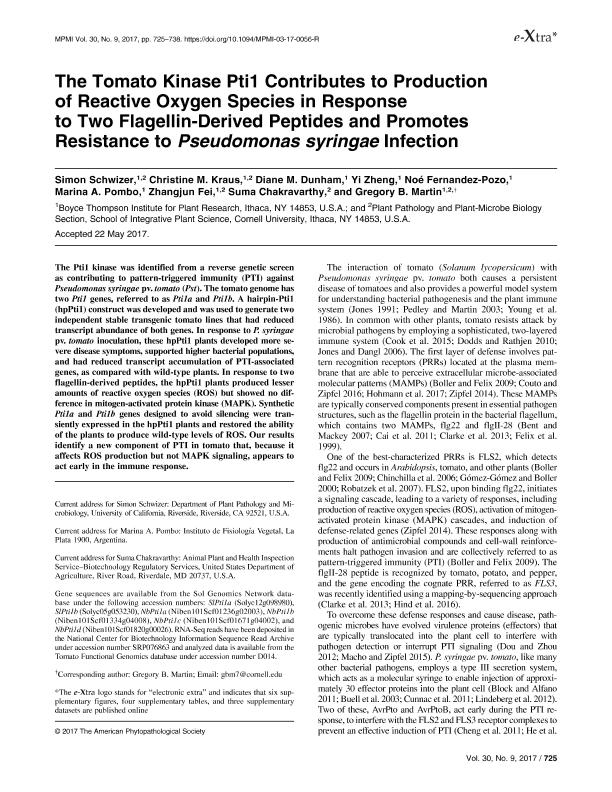Artículo
The tomato kinase pti1 contributes to production of reactive oxygen species in response to two flagellin-derived peptides and promotes resistance to pseudomonas syringae Infection
Schwizer, Simon; Kraus, Christine M.; Dunham, Diane M.; Zheng, Yi; Fernandez Pozo, Noé; Pombo, Marina Alejandra ; Fei, Zhangjun; Chakravarthy, Suma; Martin, Gregory B.
; Fei, Zhangjun; Chakravarthy, Suma; Martin, Gregory B.
 ; Fei, Zhangjun; Chakravarthy, Suma; Martin, Gregory B.
; Fei, Zhangjun; Chakravarthy, Suma; Martin, Gregory B.
Fecha de publicación:
09/2017
Editorial:
American Phytopathological Society
Revista:
Molecular Plant-Microbe Interactions
ISSN:
0894-0282
Idioma:
Inglés
Tipo de recurso:
Artículo publicado
Clasificación temática:
Resumen
The Pti1 kinase was identified from a reverse genetic screen as contributing to pattern-triggered immunity (PTI) against Pseudomonas syringae pv. tomato (Pst). The tomato genome has two Pti1 genes, referred to as Pti1a and Pti1b. A hairpin-Pti1 (hpPti1) construct was developed and was used to generate two independent stable transgenic tomato lines that had reduced transcript abundance of both genes. In response to P. syringae pv. tomato inoculation, these hpPti1 plants developed more severe disease symptoms, supported higher bacterial populations, and had reduced transcript accumulation of PTI-associated genes, as compared with wild-type plants. In response to two flagellin-derived peptides, the hpPti1 plants produced lesser amounts of reactive oxygen species (ROS) but showed no difference in mitogen-activated protein kinase (MAPK). Synthetic Pti1a and Pti1b genes designed to avoid silencing were transiently expressed in the hpPti1 plants and restored the ability of the plants to produce wild-type levels of ROS. Our results identify a new component of PTI in tomato that, because it affects ROS production but not MAPK signaling, appears to act early in the immune response.
Palabras clave:
Pattern-Triggered Immunity
,
Pti1
,
Ros Production
,
Tomato Defense
Archivos asociados
Licencia
Identificadores
Colecciones
Articulos(INFIVE)
Articulos de INST.DE FISIOLOGIA VEGETAL
Articulos de INST.DE FISIOLOGIA VEGETAL
Citación
Schwizer, Simon; Kraus, Christine M.; Dunham, Diane M.; Zheng, Yi; Fernandez Pozo, Noé; et al.; The tomato kinase pti1 contributes to production of reactive oxygen species in response to two flagellin-derived peptides and promotes resistance to pseudomonas syringae Infection; American Phytopathological Society; Molecular Plant-Microbe Interactions; 30; 9; 9-2017; 725-738
Compartir
Altmétricas



